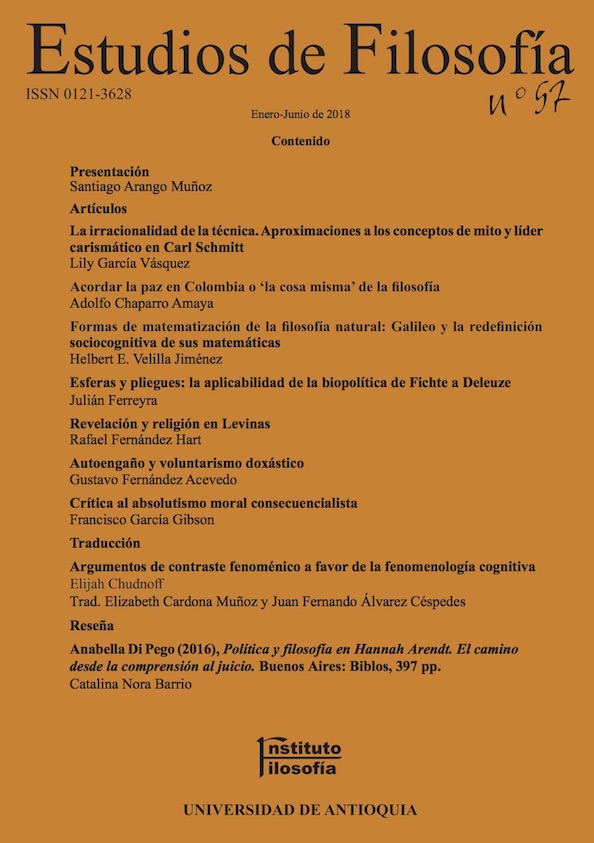Revelation and religion in Levinas
DOI:
https://doi.org/10.17533/udea.ef.n57a06Keywords:
revelation, espirituality, counter–phenomenon, infinite, transcendenceAbstract
This article proposes a descriptive analysis of Levinas's work based on the term ‘revelation’. The clarication of the term requires understanding the two sources which Levinas makes converse: the Bible and the philosophers. In this dialogue, Levinas uses phenomenology to show how the phenomenological consciousness is interrupted by the Infinite. In this sense, dealing with this disruption shall imply both thinking about the essence of human being and describing its spirituality: the spirituality of human being is expressed as an ethical endeavor. The article aims to show that the scope of the Levinasian thesis about revelation allows the concept of religion update, that is, to sketch a new philosophy of religion as an ethical mandate, therefore, avoiding any confusion with theological work.
Downloads
References
Abensour, M. (1991). Commentaire a quelques réflexions de Levinas. En: E. Levinas, Cahiers de l’Herne. Paris, Ed. de l’Herne.
Calin, R., & Sebbah, F.–D. (2002). Le Vocabulaire de Lévinas. Paris, Ellipses.
Descartes, R. (1967). Méditations Métaphysiques. En: Descartes, R. Oeuvres Philosophiques (Vol. II). Paris, Editions Garnier Frères.
Fernández Hart, R. (2013). Creo luego existo. Revelación y religión en Levinas. Lima: Fondo editorial de la Universidad Antonio Ruiz de Montoya.
Harris, S. (2007). El fin de la fe. Religión, terror y el futuro de la razón. España: Editorial Paradigma.
Janicaud, D. (1998). La Phénoménologie éclatée. Paris: Editions de l’Eclat.
Kant, I. (1993). Crítica de la razón pura. Trad. de P. Ribas. Madrid: Alfaguara.
Levinas, E. (1974). Autrement qu’être ou au–delà de l’essence. The Hague, Boston, Lancaster: Martinus Nijho.
Levinas, E. (1977). Les dommages causés par le feu. En: Levinas, E. Du sacré au saint. Paris: Ed. du Minuit.
Levinas, E. (1982a). De l’évasion. Paris: Fata Morgana.
Levinas, E. (1981). Amour et révélation. En: P. H.–P. (présentation), La Charité aujourd’hui. Paris: Ed. S.O.S.
Levinas, E. (1982b). La révélation dans la tradition juive. En: Levinas, E. L’Au–delà du verset. Paris: Editions de Minuit.
Levinas, E. (1982c). Quatre lectures talmudiques. Paris: Editions de Minuit.
Levinas, E. (1984). Totalité et in ni. The Hague, Boston, Lancaster: Martinus Nijho.
Levinas, E. (1989). Ecrit et sacré. En: Vieillard–Baron, J. & Kaplan, F. (Eds.), Introduction à la philosophie de la religion. Paris: Cerf.
Levinas, E. (1991a). L’inspiration religieuse de l’Alliance. En: Levinas, E., Chalier, C. & Abensour, M. (Eds.), Cahiers de l’Herne. Paris: Ed. de L’Herne.
Levinas, E. (1991b). Quelques réflexions sur la philosophie de l’hitlérisme. En: Levinas, E., Chaier, C. & Abensour, M. (Éds.), Cahiers de l’Herne. Paris: Ed. de L’Herne.
Levinas, E. (1998). Dieu et la philosophie. En: Levinas, E. De Dieu qui vient à l’idée. Paris: VRIN.
Levinas, E. (2006). Difficile liberté. Essais sur le judaïsme. Paris: Albin Michel.
Ricœur, P. (1986). A l’école de la phénoménologie.Paris: VRIN.
Ricœur, P. (1986). A l’école de la phénoménologie. Paris: VRIN.
Rolland, J. (2000). Parcours de l’Autrement. Paris: PUF.
Sebbah, F.–D., & Salanskis, J.–M. (2008). Usages contemporains de la phénoménologie. Paris: Sens & Tonka.
Published
How to Cite
Issue
Section
Categories
License
Copyright (c) 2018 Rafael Fernández

This work is licensed under a Creative Commons Attribution-NonCommercial-ShareAlike 4.0 International License.
Authors who publish with this journal agree to the following terms:
1. The Author retains copyright in the Work, where the term "Work" shall include all digital objects that may result in subsequent electronic publication or distribution.
2. Upon acceptance of the Work, the author shall grant to the Publisher the right of first publication of the Work.
3. The Author shall grant to the Publisher a nonexclusive perpetual right and license to publish, archive, and make accessible the Work in whole or in part in all forms of media now or hereafter known under a Creative Commons Attribution-NoCommercia-ShareAlike (CC BY-NC-SA 4.0), or its equivalent, which, for the avoidance of doubt, allows others to copy, distribute, and transmit the Work under the following conditions: (a) Attribution: Other users must attribute the Work in the manner specified by the author as indicated on the journal Web site;(b) Noncommercial: Other users (including Publisher) may not use this Work for commercial purposes;
4. The Author is able to enter into separate, additional contractual arrangements for the nonexclusive distribution of the journal's published version of the Work (e.g., post it to an institutional repository or publish it in a book), as long as there is provided in the document an acknowledgement of its initial publication in this journal;
5. Authors are permitted, and Estudios de Filosofía promotes, to post online the preprint manuscript of the Work in institutional repositories or on their Websites prior to and during the submission process, as it can lead to productive exchanges, as well as earlier and greater citation of published work (see The Effect of Open Access). Any such posting made before acceptance and publication of the Work is expected be updated upon publication to include a reference to the Estudios de Filosofía's assigned URL to the Article and its final published version in Estudios de Filosofía.















